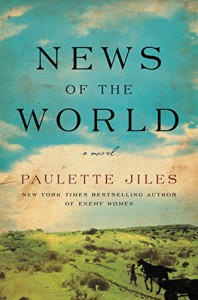A good story about a child and an old man who learn from each other.

Captain Jefferson Kidd travels around from small town to small town, like Cyrano de Bergerac, reading from newspapers and sharing the news of the world with those who pay a dime for the privilege of listening to him read it. Newspapers were scarce then and not everyone could read. For some it was a social event, and for some it was a time to raise a ruckus. Once, the captain had his own printing press, but the wars during his lifetime had taken their toll. He had lived seven decades, and he missed both his deceased wife and his former newsman’s life. His two daughters lived in Georgia, where the Civil War had also altered their lifestyles. They did not have the money to rejoin him in his home town in Texas, but he hoped they would some day soon.
During his travels, he arrived in a town and noticed the same man he had seen at his last couple of readings. He wondered why he had been following him. The man, soon revealed his reason. Britt Johnson*, asked the captain to take a child back to her German relatives. He offered him the $50 gold coin he was given for the task, because he said the child was belligerent and white. He did not think, as a black man, that he could guarantee her safety or his own. The child had been kidnapped at the age of six. She witnessed the death of both her parents and her younger sister who were murdered by the Kiowa. Now, after four years, she had forgotten her past and fully identified with the Indian tribe more than with her own true biological background. The captain agreed to take Johanna home to an aunt and uncle because, although he was old and the journey would be hard, he felt it was the right thing to do. How he managed to get Johanna to her relatives and what he learned about them, was the crux of the novel.
As they traveled together, they both learned more about life from each other. Just as the captain tried to help Johanna adjust to the more civilized world, this precocious child showed him how comfortable it was to live in the more savage world of her last four years. She was a survivor and she became a great help to him. She was resourceful, intuitive, precocious and far more mature than her years.
Soon, although the child and the captain were burdened with their memories, they learned how to comfort each other and fulfill each other’s need for affection and someone to trust. The story of their travels and relationship was both interesting and exciting to read as the lawlessness and danger of the territories began to surface on each page. The author’s description of the time and place made the reader feel right in the thick of it. How they survived and moved off into the future was simply a good story. However, the writing style was unusual because no quotations were used to delineate speech from pure narrative which sometimes led to confusion. Also, it was difficult to tell which parts of the story were based on real history and which were based on the author’s imagination.
*Britt Johnson is the stuff of legends. A hero, Johnson was the slave of Moses Johnson who freed him and gave him money enabling him to rescue his own family from the Indians.


